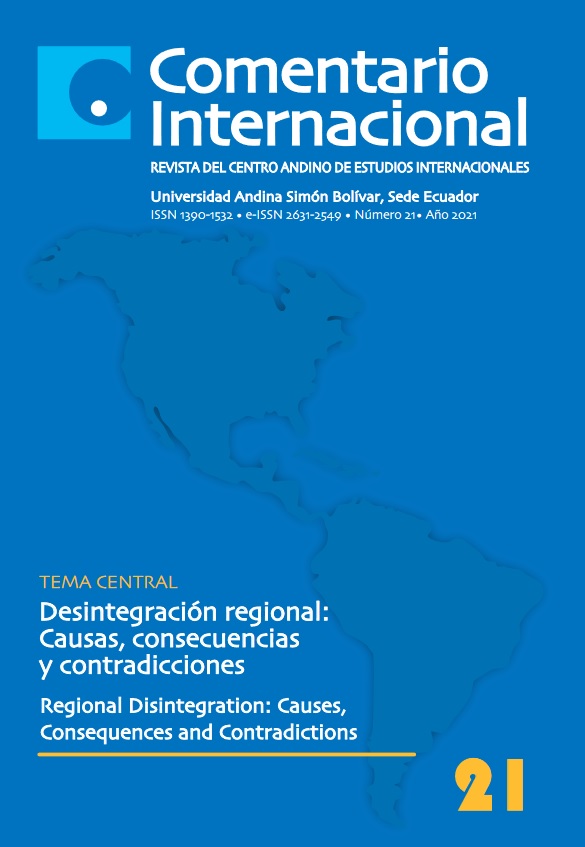Brexit, Englixit? Disintegration and How Taking Back Control Means Giving Up Control
DOI:
https://doi.org/10.32719/26312549.2021.21.5Keywords:
Brexit, English language, EU, UK, lingua franca, Euro EnglishAbstract
This contribution seeks to explore what disintegration can mean for a language, with a focus on Brexit and the English language. Linguistic differences are often instrumentalized as drivers of disintegration. However, in the case of Brexit, disintegration will also affect the status of the English language. Due to the decision of the United Kingdom to leave the European Union, English will no longer be a first official language of any European member state; it is only the second official language in Ireland and Malta. This has important political and legal repercussions, that affect the future of the English language in the EU after Brexit. Based on desk research, we see two avenues for the future of the English language within the EU: it could be replaced by another major European language (German/ French), or could become a real European lingua franca. The latter option seems most reasonable as the English language has taken a firm foothold among young (and older) Europeans but entails that by taking back control of its decision-making processes by leaving the EU, the UK will lose the little control over the English language it currently still has. This tendency was already taking place both internationally as within the EU but will greatly accelerate after Brexit.
Downloads
References
Adams, Richard. “Learning Foreign Languages Should Be Compulsory, Says Report”. The Guardian. January 9th, 2020. https://bit.ly/400BbGL.
Alesina, Alberto, and Enrico Spolaore. The Size of Nations. Cambridge, US: MIT Press, 2003.
Bolton, Kingsley, Werner Botha and Andy Kirkpatrick, eds. The Handbook of Asian Englishes. Hoboken, US: John Wiley and Sons, 2020.
—, and Daniel Davis. “Brexit and the Future of English in Europe”. World Englishes 36, n.° 3 (2017): 302-12. https://doi.org/10.111/weng.12263.
Bourdieu, Pierre. Distinction: A Social Critique of Taste. London: Routledge, 1984.
—. Sociology in Question. London: Sage, 1993.
Bugarski, Ranko. “Language, Nationalism and War in Yugoslavia”. International Journal of the Sociology of Language 151 (2001): 69-87. https://doi.org/10.1515/ijsl.2001.048.
Council of the European Communities. Regulation No 1: Determining the Languages to Be Used by the European Economic Community. October 6th, 1958. 358/58.
Dallison, Paul. “Mario Monti: EU Should Adopt English Post Brexit”. Politico. November 21st, 2017. https://politi.co/422mUel.
European Union. Treaty on the Functioning of the European Union. March 1st, 2020.
Gazzola, Michele. “Multilingual Communication for Whom?: Language Policy and Fairness in the European Union”. European Union Politics 17, n.° 4 (2016): 546-69. https://doi.org/10.1177/1465116516657672.
Goulard, Hortense. “English Will Not Be an Official EU Language after Brexit, Says Senior MEP”. Politico. June 27th, 2016. https://politi.co/2BrTpqX.
Hong Kong. The Basic Law of the Hong Kong Special Administrative Region of the People’s Republic of China. May 2021. https://bit.ly/3Fhb4U5. India. The Constitution of India. May 2022. https://bit.ly/3yAC3py.
Iskra, Katarzyna. “Language Policy”. European Parliament. April 2022. https://bit.ly/3YxPGAA. Jacobsen, Ushma. “English in the European Union after Brexit: Inclusion Effects of a Language without an Owner”. Culture, Practice and European Policy 2, n.° 1 (2017): 9-11. https://bit.ly/3yzkfuY.
Krzy?anowski, Micha?, and Ruth Wodak. “Political Strategies and Language Policies: The European Union Lisbon Strategy and Its Implications for the EU’s Language and Multilingualism Policy”. Language Policy 10, n.° 1 (2011): 115-36. https://doi.org/10.1007/s10993-011-9196-5.
Mackey, Robert. “French President Emmanuel Macron Offers Refuge to American Climate Scientists”. The Intercept. June 1st, 2017. https://bit.ly/3Js6aWB.
McLoughlin, Bill. “EU Humiliation: Brussels Forced to Keep English as Official Language Despite UK’s Exit”. Express. September 28th, 2020. https://bit.ly/3Lh3tIY.
Modiano, Marko. “English in a Post-Brexit European Union”. World Englishes 36, n.° 3 (2017): 313-27. https://doi.org/10.1111/weng.12264
Mollin, Sandra. Euro-English: Assessing Variety Status. Tübingen, DE: Gunter Narr Verlag Tübingen, 2006.
O’Dubhghaill, Sean. “‘It’s Fake—I mean It Sounds the Same, but It’s Fake’: Plasticity, Simulation and Passing through the Irish Language in Belgium”. Irish Journal of Anthropology 17, n.° 1 (2014): 46-51. https://bit.ly/3yua3Ed.
Philipson, Jeremy, and David Symes. “‘A Sea of Troubles’: Brexit and the Fisheries Question”. Marine Policy 90 (2018): 168-73. https://doi.org/10.1016/j.marpol.2017.12.016.
Ro, Christine. “How Brexit Changed the English Language”. BBC. March 14th, 2019. https://bbc.in/424ULDC.
Roller, Elisa. “When Does Language Become Exclusivist?: Linguistic Politics in Catalonia”. National Identities 4, n.° 3 (2002): 273-89.
https://doi.org/10.1080/1460894022000026132.
Safran, William. “Introduction: The Political Aspects of Language”. Nationalism and Ethnic Politics 10, n.° 1 (2004): 1-14. https://doi.org/10.1080/13537110490450746.
Setter, Jane. “Will Brexit Spell the End of English as an Official EU Language?”. The Guardian. December 27th, 2019. https://bit.ly/3T5bItq.
Statista. “English proficiency in European countries in 2019”. Statista. February 28th, 2023. https://bit.ly/426T2Oa.
Van Kerckhoven, Sven. “Post-Brexit Leadership in European Finance”. Politics and Governance 9, n.° 1 (2021): 59-68. https://doi.org/10.17645/pag.v9i1.3705.
—, and Jed Odermatt, “Euro Clearing after Brexit: Shifting Locations and Oversight”. Journal of Financial Regulation and Compliance 29, n.° 2 (2020): 187-201. https://doi.org/10.1108/JFRC-02-2020-0021.
Watt, Nicholas. “EU Referendum: Vote Leave Focuses on Immigration”. BBC News. May 25th, 2016. https://bbc.in/3J7DJvJ.
Wouters, Jan, Sven Van Kerckhoven and Maarten Vidal. “Traditional and New Federalism in Europe: Belgium and Switzerland Compared”. In Weak States, Strong Societies?, edited by Amin Saikal, 38-59. London: IB Tauris, 2016.
Downloads
Published
How to Cite
Issue
Section
License

This work is licensed under a Creative Commons Attribution-NonCommercial 4.0 International License.
Authors who publish in this journal accept the following conditions:
1. The authors keep the copyright and assign to the journal Comentario Internacional the right of the first publication, with the work registered with the attribution license of Creative Commons, which allows third parties to use what is published whenever they mention the authorship of the work and the first publication in this journal.
2. Authors can make other independent and additional contractual arrangements for the non-exclusive distribution of the article published in this journal (eg, include it in an institutional repository or publish it in a book) provided they clearly indicate that the work was published for the first time in Comentario Internacional.







